
-
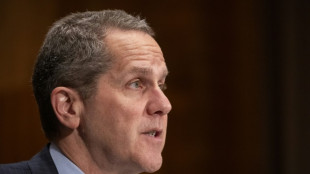 US inflation fight will take 'further time': senior Fed official
US inflation fight will take 'further time': senior Fed official
-
UK report finds cover-up of decades-long infected blood scandal

-
 Trump trial resumes, closing arguments expected next week
Trump trial resumes, closing arguments expected next week
-
Ruto on first state visit by Kenyan leader to US in two decades
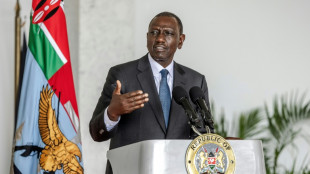
-
 African players in Europe: Superb Kudus goal in vain as City take title
African players in Europe: Superb Kudus goal in vain as City take title
-
Pope to visit Belgium, Luxembourg in September

-
 Gold hits high as Iran shock triggers haven support
Gold hits high as Iran shock triggers haven support
-
Strikes pound Gaza as Israel voices 'duty' to expand Rafah incursion

-
 Russia tries playwright and director on terror charges
Russia tries playwright and director on terror charges
-
Iran mourns president Raisi's death in helicopter crash

-
 Attack on tourists rocks fledgling Afghanistan tourism sector
Attack on tourists rocks fledgling Afghanistan tourism sector
-
Paralympics should put disability back on global agenda, says IPC chief

-
 South Africa's top court strikes Zuma from ballot
South Africa's top court strikes Zuma from ballot
-
Crunch time looms for BHP's bid buy Anglo American

-
 Kane to face old club Spurs for first time in Seoul
Kane to face old club Spurs for first time in Seoul
-
Markets rise as traders cheered by China property plan
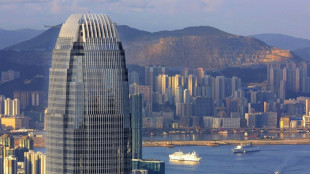
-
 Black farmers in Brazil changing views on coffee production
Black farmers in Brazil changing views on coffee production
-
Iran's President Raisi declared dead in helicopter crash

-
 Australia police arrest 554 in domestic violence crackdown
Australia police arrest 554 in domestic violence crackdown
-
South Korea, Britain host AI summit with safety top of agenda

-
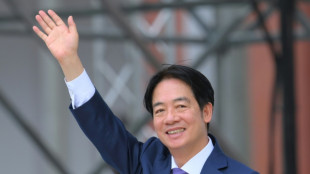 New president Lai vows to defend Taiwan's democracy
New president Lai vows to defend Taiwan's democracy
-
Forever fad: Rubik says his cube 'reminds us why we have hands'

-
 Trump eyes witness stand as trial draws to a close
Trump eyes witness stand as trial draws to a close
-
Ryanair annual profit jumps on higher demand, fares

-
 High-priced Cummins, Starc face off as IPL enters playoffs
High-priced Cummins, Starc face off as IPL enters playoffs
-
Iran media says President Raisi died in helicopter crash

-
 Dominican Republic President Abinader re-elected to 2nd term
Dominican Republic President Abinader re-elected to 2nd term
-
New Taiwan president Lai hails 'glorious' democracy
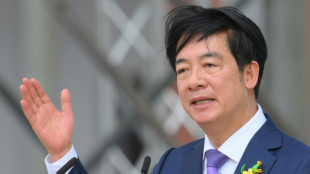
-
 New Caledonia separatists defy French efforts to unblock roads
New Caledonia separatists defy French efforts to unblock roads
-
Timberwolves knock out defending champion Nuggets, Pacers oust Knicks

-
 Trump biopic hits Cannes Film Festival
Trump biopic hits Cannes Film Festival
-
Iran President Raisi's helicopter found, 'no sign of life'

-
 Three talking points ahead of 2024 French Open
Three talking points ahead of 2024 French Open
-
'Haikyu!!': Comic heroes fuel Japan Olympic volleyball manga mania

-
 Timberwolves rally to knock defending champion Nuggets out of NBA playoffs
Timberwolves rally to knock defending champion Nuggets out of NBA playoffs
-
London court set to rule on Julian Assange extradition
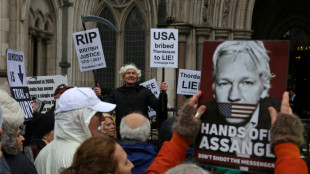
-
 Business and Bollywood votes in India election
Business and Bollywood votes in India election
-
Pope calls anti-migrant attitudes at US border 'madness'

-
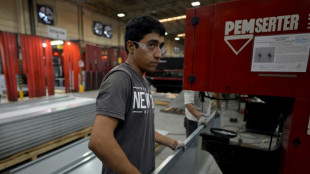 Mexico aims to be big economic winner from US-China tensions
Mexico aims to be big economic winner from US-China tensions
-
Uncertain future for thousands after deadly Brazil floods
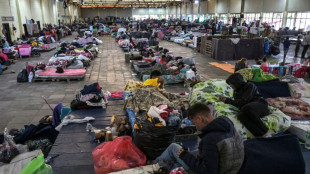
-
 Schauffele makes the putt of his life for first major win
Schauffele makes the putt of his life for first major win
-
Wirtz returns to help unbeaten Leverkusen chase history

-
 Search for Iran's President Raisi after helicopter goes missing
Search for Iran's President Raisi after helicopter goes missing
-
DeChambeau's powerful putting has him excited for US Open

-
 Taiwan to swear in new president as China pressure grows
Taiwan to swear in new president as China pressure grows
-
Atalanta can end 61-year wait for trophy in Europa League final

-
 Schauffele birdies final hole to capture PGA for first major win
Schauffele birdies final hole to capture PGA for first major win
-
Guardiola casts doubt over long-term Man City future

-
 Hollywood icons Costner and Demi Moore make Cannes comeback
Hollywood icons Costner and Demi Moore make Cannes comeback
-
Pacers shoot down Knicks to reach NBA Eastern Conference finals

| RBGPF | -3.59% | 57.63 | $ | |
| CMSC | -0.15% | 24.474 | $ | |
| SCS | 0.29% | 13.67 | $ | |
| NGG | 0.56% | 73.24 | $ | |
| GSK | 0.02% | 44.99 | $ | |
| RELX | -0.16% | 44 | $ | |
| RYCEF | 0.15% | 5.298 | $ | |
| BCC | -0.91% | 136.05 | $ | |
| VOD | 0.1% | 9.8 | $ | |
| BCE | -0.18% | 34.28 | $ | |
| AZN | -0.27% | 76.691 | $ | |
| JRI | 0.19% | 11.602 | $ | |
| CMSD | -0.54% | 24.17 | $ | |
| BTI | -0.32% | 31.49 | $ | |
| BP | 0.01% | 37.495 | $ | |
| RIO | -0.56% | 73.2 | $ |

In Benin, tensions soar over cost of living
In the heart of Cotonou’s large Dantokpa market, Diane Makpenon's family corn shop is less busy than usual these days.
The business run by her mother like others in Benin’s economic capital has been slowing down as they struggle with rising prices.
The price of a kilo (2.2 pounds) of corn, one of the country’s most widely consumed foods, rose from 200 CFA francs (0.30 euro cents) to 450 CFA francs, before falling again to 400 CFA francs within a few days, according to traders.
A 120-kilo bag is now sold for between 33,000 (about 50 euros, nearly $54) and 36,000 CFA francs compared to barely 30,000 CFA francs before.
The increase in food costs in the small West African nation prompted Benin’s labour unions to call for an unprecedented series of protests against the cost of living -- the first was dispersed by police firing tear gas and a second banned by the authorities.
A third planned for Cotonou on Saturday has been granted authorisation by city officials.
Benin’s consumer prices and economy have been hit by fallout from the Ukraine war and by the closure of the border with major trading partner Niger to the north following a coup there last July.
Neighbouring Nigeria's naira currency devaluation and abrupt end of a decades-long fuel subsidy have also impacted Benin's fuel prices and trade.
"Going to the market has become torture. Everything costs us so much that we are helpless," said Roberte Akododja, 42, owner of a bistro in Cotonou's popular Gbegamey district.
"Even in restaurants, you have to pay more for usual meals or settle for small portions," said Delphin Agossohou, a private administration executive.
Camille Segbedji, one of the leaders of the National Union of Secondary Teachers and Administrative Personnel of Benin (SYNEPAS), criticised the absence of a "fair agricultural policy" from the government in the face of declining purchasing power.
The World Bank said Benin's economy in 2023 was still resilient despite the external economic shocks the country had to weather.
At a cabinet meeting this week, the government temporarily suspended shipments of cereals outside the country in a bid to ease pressure on prices.
- In the streets –
Political protests have become less common in Benin since President Patrice Talon came to power in 2016, with some major opposition leaders either in exile or jailed.
Critics regularly accuse the cotton magnate of taking an authoritarian turn in a country once praised as a beacon of pluralism in West Africa.
Protesting over high costs, the main unions organised a demonstration in Cotonou on April 27 which was banned by the police who used tear gas to break up the rally.
Nearly 30 demonstrators and leaders of the trade union movement were arrested on that day, before being released a little later.
"The workers are struggling to make themselves heard. We have demands, but no way of expressing them," explained nurse Arsene Olory-Togbe, aged 48.
On May 1, the Confederation of Benin Workers' Unions (CSTB Benin), the country's main trade union, rallied in a new demonstration, which was immediately banned by the authorities.
This time, 72 demonstrators were arrested, including 21 placed in pre-trial detention for cannabis consumption.
"Our motivations relate to the unhappiness among citizens today. The high cost of living and the decline in purchasing power," said Anselme Amoussou, general secretary of CSA Benin, the country's second largest trade union organisation.
Despite the ban and cancellation of demonstrations in recent days, trade unionists have once again called on the population to protest against the high cost of living on May 11 in the economic capital of Benin.
"No worker is happy to take to the streets, it is never light-hearted. But in certain situations it is necessary," said teaching union representative Segbedji.
For CSA union leader Amoussou workers just wanted dialogue, a more human approach from the government and the guarantee of labour union rights.
"Wondering whether the peaceful march will be repressed is sad for a democratic country like Benin," he said.
L.Dubois--BTB
